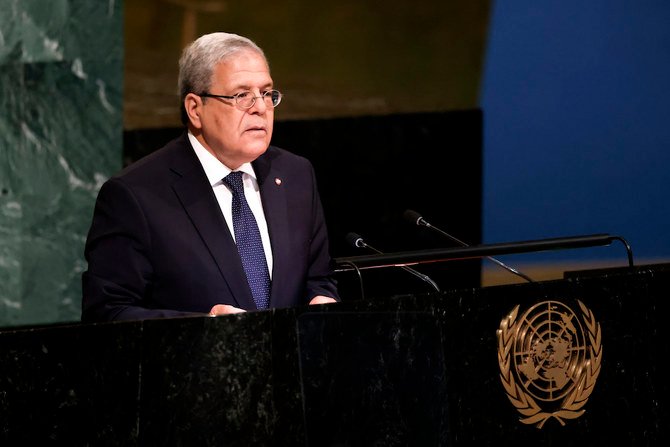Tunisia is working on democratic reforms through parliamentary elections in the wake of months of civil unrest, the country’s foreign minister told the UN General Assembly on Monday.
Othman Jerandi said Tunisia’s development goals remain in line with UN ambitions, describing the organization’s agenda as a “ray of hope” for the international community.
A key focus for the country is to restructure debt and create projects that will generate wealth, he added.
“Democracy for Tunisia is a national choice — one that it will not deviate from. We are working on a reform process through parliamentary elections,” said Jerandi.
“This is the will of the people of Tunisia, who are committed to preserving freedom, constitutional rights, rule of law and sovereignty. Tunisia is always on the side of our universal common principles.”
But he warned that amid spiraling global crises — including climate change, migration, food insecurity and natural disasters — each country “has its own challenges, own problems and own characteristics,” and that “one-size-fits-all models” are unfit for purpose.
Jerandi said it is “regrettable that millions of people around the world are being threatened with being left behind because of the imbalance in the international economic system and a lack of solidarity.”
He highlighted the urgency of energy and food crises felt worldwide, saying the COVID-19 pandemic, supply chain issues and the Russia-Ukraine conflict have exacerbated economic woes.
“This is a critical point in our common destiny and history. We must find transformative, radical solutions that allow us to overcome our circumstances and strengthen durability and resilience,” he added.
“Our peoples are watching us and wondering whether the international community will be able to find these transformative solutions, and whether they will show the required political will to overcome these global crises that continue to worsen.”
Jerandi described the process of finding solutions as a constant concern, adding that “at each (UN) session, new issues are added to those that remain.”
He said: “Crises must be addressed from the roots — if not, it is but a temporary solution. We must find new, just solutions as proposed in our common agenda.”
Jerandi listed a series of proposals to the UNGA, saying solutions “can only be developed through multilateral action and in the spirit of solidarity in coordination with the UN.”
He said: “There must be an economic model created that focuses on quality as opposed to the speed of growth — in particular through investment in modern technology and science.” He noted Tunisia’s hosting of a summit on digital development to achieve national goals.
He added: “It is time to move forward on debt management through new approaches. We must adapt the international monetary order and financial systems, which must be based on national specifics and national needs — in particular in developing countries and in Africa.
“These countries have not found the support they expected to overcome challenges and promote growth as well as achieve the (UN) SDGs (Sustainable Development Goals).
“Peoples must be able to regain the resources that have been stolen from them. Africa must achieve equal partnerships, equality and better development.”
Jerandi spoke about the Palestinian issue, which he said “requires the end of occupation and the creation of an independent Palestinian state with Jerusalem as its capital.”
He added: “We must work to overcome disputes through peaceful means, end absurd conflicts and find solutions to just causes.
“We must move beyond analysis and toward actions. Our peoples no longer want to hear empty promises.”

